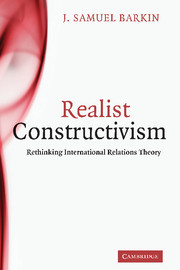2 - Definitions
Published online by Cambridge University Press: 05 June 2012
Summary
The first step in a discussion of the relationship between constructivism and realism is defining the two terms as they are used in this book. This is a key step, because debates across paradigmatic lines are often characterized by participants talking past each other, rather than communicating effectively. Part of the reason that scholars engaged in these debates so often talk past each other has to do with the nature of paradigmatic debate, which encourages neither reading nor constructively engaging the work of those working in different paradigms. The defense of paradigmatic castles is not the best starting point for an open exchange of ideas about the study of international politics. Overcoming this problem is a question of mindset rather than a question of definition.
Another part of the reason so many scholars in the field talk past each other when discussing issues of paradigm and epistemology, however, is simple terminological confusion. Scholars tend to redefine terms frequently, creating a situation in which the same term is used by different authors with very different meanings. This observation holds for most of the key terms in this book, and certainly for the two main concepts: constructivism and realism. The confusion is exacerbated by individual authors who provide different definitions for the same words. For example, Alexander Wendt speaks of both political and scientific realism, arguing that the two are incompatible.
- Type
- Chapter
- Information
- Realist ConstructivismRethinking International Relations Theory, pp. 13 - 30Publisher: Cambridge University PressPrint publication year: 2010

